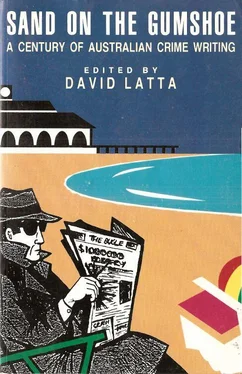David Latta - Sand on the Gumshoe - a century of Australian crime writing
Здесь есть возможность читать онлайн «David Latta - Sand on the Gumshoe - a century of Australian crime writing» весь текст электронной книги совершенно бесплатно (целиком полную версию без сокращений). В некоторых случаях можно слушать аудио, скачать через торрент в формате fb2 и присутствует краткое содержание. Жанр: Детектив, на английском языке. Описание произведения, (предисловие) а так же отзывы посетителей доступны на портале библиотеки ЛибКат.
- Название:Sand on the Gumshoe: a century of Australian crime writing
- Автор:
- Жанр:
- Год:неизвестен
- ISBN:нет данных
- Рейтинг книги:5 / 5. Голосов: 1
-
Избранное:Добавить в избранное
- Отзывы:
-
Ваша оценка:
- 100
- 1
- 2
- 3
- 4
- 5
Sand on the Gumshoe: a century of Australian crime writing: краткое содержание, описание и аннотация
Предлагаем к чтению аннотацию, описание, краткое содержание или предисловие (зависит от того, что написал сам автор книги «Sand on the Gumshoe: a century of Australian crime writing»). Если вы не нашли необходимую информацию о книге — напишите в комментариях, мы постараемся отыскать её.
Sand on the Gumshoe: a century of Australian crime writing — читать онлайн бесплатно полную книгу (весь текст) целиком
Ниже представлен текст книги, разбитый по страницам. Система сохранения места последней прочитанной страницы, позволяет с удобством читать онлайн бесплатно книгу «Sand on the Gumshoe: a century of Australian crime writing», без необходимости каждый раз заново искать на чём Вы остановились. Поставьте закладку, и сможете в любой момент перейти на страницу, на которой закончили чтение.
Интервал:
Закладка:
Mr Blackburn smiled. ‘Suppose you answer that one?’
‘I?’
Jeffery sipped his tea. ‘She was to have taken the short cut to the summer house and then come up to your room. That was why you pretended to go upstairs after dinner for that book. But you went to your room, to wait for Sally and join in the grand laugh against my wife. But Sally didn’t turn up. How worried you must have been! And how frantic you are right now!’
Miss Rountree sat down very suddenly. Her face seemed to shrivel and contract. She took off her glasses and dabbed at her eyes with a lace handkerchief. But no tears came; only short, dry sobs so embarrassing to hear that Elizabeth turned her face away.
‘I didn’t want to do it.’ Miss Rountree whispered. ‘Sally said it would be all right. That it was only a party game – a joke.’ The husky mutter ended abruptly in a quick, choked-off gasp. Elizabeth, looking up, saw she was staring at the french windows – windows which framed the figure of John Wilkins. A different Wilkins, no longer pink, immaculate and imperturbable, but flushed, and with the appearance of a man who had dressed in a great hurry.
‘Hello,’ he said and they noticed that he was breathless. ‘I suppose you’ve wondered what on earth happened to me?’
‘Mr Wilkins,’ gasped Florence Rountree. ‘What are you doing here?’
‘I can tell you that,’ replied Jeffery and he held up the black bag. ‘Mr Wilkins has come back for this.’
Then things happened very quickly. Wilkins gave a little snort of anger and strode forward, snatching at the bag with greedy hands. At the same moment, Jeffery’s fingers tightened like iron on the handle. For some seconds, this frenzied tug-of-war continued, both men swaying and straining. There came the sudden sound of ripping material and the antagonists staggered back each holding part of the dismembered bag – a bag that vomited forth packets of crisp new banknotes. Some of these packets burst the rubber bands which held them and notes fluttered wildly to the floor so that Elizabeth stood soles-deep in a fortune. Then, like a quick-motion film suddenly jammed in the projector, the tableau froze. The two men stared down at the littered floor and while Wilkin’s face was angry and dismayed, Mr Blackburn’s countenance was deeply reproachful.
He looked up at Wilkins and shook his head. ‘Your shareholders are going to be very, very annoyed about this,’ he announced. ‘This is their money, you know.’ And as the absconding financier stared at him, stonyfaced, Jeffery went on. ‘You were staying with Jim and Sally Rutland, so you overheard them planning the disappearing trick on us. That’s how you learned about the panel in the door. And you saw a heaven-sent opportunity to disappear yourself – and let the Rutland ’s face up to the police investigation that must follow.
‘I rather suspect that the shifty-eyed chauffeur you employ is in this thing with you. Tonight he was waiting in the summerhouse for you, but Sally, taking the passage to the summerhouse following her vanishing trick, surprised him there. No doubt he trussed her up to prevent her talking too much.’
Wilkins had recovered some of that hard poise. Now he thrust his hands in his pockets and managed a twisted smile. ‘Interesting. Blackburn,’ he murmured, ‘but go on.’
‘Thank you,’ said Mr Blackburn, ‘I intend to. When Sally disappeared, Rutland didn’t turn a hair. But when you presumably vanished, he was worried, for here was something he hadn’t planned. And when he found you’d cut the telephone wire, he was dead scared. He knew then it was a ease for the police. But you had other ideas. Unfortunately for you, in the scuffle with Rutland, you dropped this bag and a servant brought it in here. And naturally, you weren’t going to leave without this money!’
Wilkins said smoothly. ‘Circumstances alter cases, Blackburn!’ One hand shot from his pocket and it held a small black automatic. ‘I regret this touch of melodrama, but it’s essential that I’m out of this country by the morning.’ Keeping that automatic ominously steady, he began to retreat toward the french windows. ‘And I don’t intend letting anyone stop me!’
Elizabeth turned her head slowly. Miss Rountree sat like someone paralysed, jaw dropping and codfish eyes wide and staring. Jeffery’s face was dark and set. He made a half-movement and the automatic swung up level with his chest. Oh, my God, thought Elizabeth – he’s going to charge! She gave an almost audible sigh of relief when Jeffery stiffened and was immobile. A coal fell in the fireplace and her spine prickled with the shock. Wilkins was almost to the french window and reaching out one stiff hand to push it wider.
And there was Evan Lambert. Evan Lambert and two stocky figures in blue uniforms who leapt forward almost simultaneously. There was a sharp crack and the acrid tang of gunpowder before Wilkins disappeared in a tangle of waving arms.
Midnight was chiming when Lambert returned. ‘Seems I came back just in time,’ he observed, then paused as the hum of a retreating car was heard. ‘There go the Terrible Twins, alias Wilkins and Tucker.’
‘And good riddance, too,’ said Elizabeth shakily. ‘Now, what about Sally?’
‘She’s in her room,’ Lambert replied. ‘They found her tied up in the summer-house. Poor kid – she’s had the scare of her life -’
Mr Blackburn nodded with some satisfaction. ‘The trouble with practical jokes,’ he announced, ‘is that they have the damndest way of kicking back!’ He took his wife’s hand. ‘Come on, darling, let’s go up and comfort Jim Rutland. Doctor Preston tells me he’s going to have a very sore head tomorrow.’
ARTHUR UPFIELD
One of the giants of Australian crime fiction, Arthur Upfield, was born in Gosport, Hampshire, in 1888 and came to Australia in 1911. He worked and travelled widely, particularly through the outback, and upon the outbreak of World War 1 joined the Australian Imperial Forces. Upfield served at Gallipoli, and in Egypt and France, and returned to England after the war as private secretary to a British Army officer.
Australia proved too much of an attraction and Upfield was back in 1921. He tried prospecting, pearling and labouring, and at one time patrolled a 320 kilometer section of a rabbit-proof fence across Western Australia. The year was 1929 and it proved an important period in Upfield’s career.
While working as a boundary rider, Upfield was busy planning the perfect crime, or rather the perfect plot for his newly realised fictional detective, Inspector Napoleon Bonaparte of the Queensland Police. With the help of his workmates, Upfield devised the central mechanism of his 1931 novel, The Sands of Windee (London, Hutchinson, 1931), a short story, ‘Wisp of Wool and Disk of Silver’, and unintentionally, a real life murder mystery. One John Thomas Smith, alias Snowy Rowies, a station hand who had assisted Upfield in the search for the perfect murder plot, put it into action. In March 1932 Rowies was found guilty of murder and executed three months later.
The Sands of Windee, serialised in The Western Mail newspaper at the time of Rowies’ Trial, was a major success for Upfield. His own account of the Snowy Rowies story, The Murchison Murders, was published (Sydney, Midget Masterpiece Publishing Company) in 1934. Upfield continued producing Bony thrillers, 29 novels in all, until his death in Bowral, New South Wales, in 1964. The last, The Lake Frome Monster, was completed by J.L. Price and Dorothy Strange and published in 1966.
‘Wisp of Wool and Disk of Silver’ was especially written for the Ellery Queen Mystery Magazine and is the only short story by Upfield. It is interesting to compare it with The Sands of Windee, if only to discover how authors sometime hate to leave a good idea alone.
Читать дальшеИнтервал:
Закладка:
Похожие книги на «Sand on the Gumshoe: a century of Australian crime writing»
Представляем Вашему вниманию похожие книги на «Sand on the Gumshoe: a century of Australian crime writing» списком для выбора. Мы отобрали схожую по названию и смыслу литературу в надежде предоставить читателям больше вариантов отыскать новые, интересные, ещё непрочитанные произведения.
Обсуждение, отзывы о книге «Sand on the Gumshoe: a century of Australian crime writing» и просто собственные мнения читателей. Оставьте ваши комментарии, напишите, что Вы думаете о произведении, его смысле или главных героях. Укажите что конкретно понравилось, а что нет, и почему Вы так считаете.












